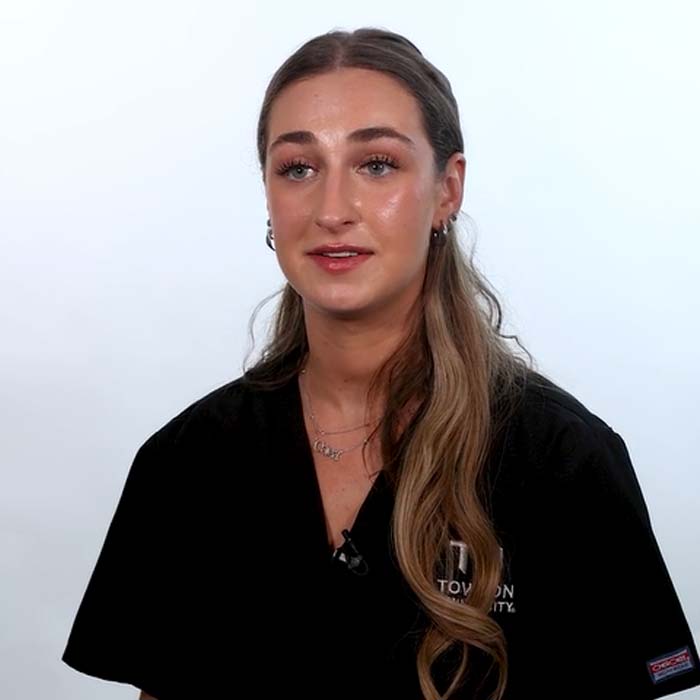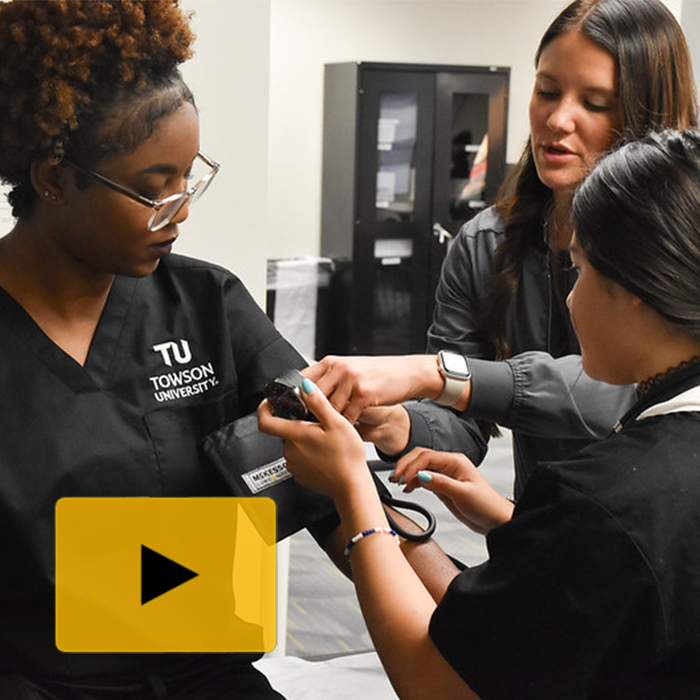
CCMA student spotlight: Samantha Zudov
TU’s CCMA program is helping Samantha build a foundation for a future career in healthcare.
Learn MoreGain the clinical and procedural knowledge to become a Certified Clinical Medical Assistant and join the growing healthcare field.
Certified clinical medical assistants use their clinical knowledge and skills to safely care for patients during their doctor’s visits. Towson University’s Certified Clinical Medical Assistant (CCMA) Program will prepare you for the CCMA exam and a rewarding career working in a doctor's office.
Program Format: TU’s CCMA program includes modules that incorporates in-person clinicals with self-paced learning. Upon completion, you'll be placed in a required externship.
Total Hours: 518 hours
Tuition: $4,899
($200 required non-refundable pre-enrollment screening included)
Materials: Tuition includes all course materials such as a standard stethoscope, blood pressure cuff, one set of TU branded scrubs, certification exam voucher, access to NHA digital learning tools, and the American Heart Association BLS for healthcare providers course.
Have questions? Contact us for more info.
This course is WIOA approved and is on the Maryland Eligible Training Provider List (ETPL).
| Important Dates | REgister |
|---|---|
| Accelerated Clinical Clinical dates: May 26–July 2, 2026 Clinical schedule: Tuesday/Thursday, 8 a.m.–2 p.m. (in-person) Make-up date: July 8, 2025* |
Pre-enroll by April 24 |
| Clinical dates: August 15–November 7, 2026 Class not held September 5 Clinical schedule: Saturday, 8 a.m.–2 p.m. (in-person) Make-up date: November 14, 2026* |
Pre-enroll by July 17 |
| Clinical dates: October 27, 2026–February 4, 2027 Class not held November 24, 26 and December 22, 24, 28, 30 Clinical schedule: Tuesday/Thursday, 6:30–9:30 p.m. (in-person) Make-up date: February 9, 2027* |
Pre-enroll by September 25 |
| Clinical dates: February 20–May 15, 2027 Clinical schedule: Saturday, 8 a.m.–2 p.m. (in-person) Make-up date: May 22, 2027* |
Pre-enroll by January 22 |
| Clinical dates: May 25–July 1, 2027 Clinical schedule: Tuesday/Thursday, 8 a.m.–2 p.m. (in-person) Make-up date: July 6, 2027* |
Pre-enroll by April 30 |
*Make-up dates are for classes that cannot be held due to weather-related closures, facilities issues, and/or unexpected instructor illness.

Being a CCMA is a stable, meaningful job, and certification is relatively quick.
Learn More
Certified Clinical Medical Assistants are important members of medical teams.
Learn More
Hear directly from our students and clinical instructors about the impact of our program.
Watch VideosCCMAs perform a variety of tasks, including taking patient medical histories and personal information, preparing laboratory samples for testing and measuring vital signs, such as temperature, weight and blood pressure, along with administrative tasks.
CCMAs work in physicians’ offices, hospitals, outpatient clinics and other healthcare facilities.
Becoming certified shows your that you have obtained the proper training and skillset needed to be a successful clinical medical assistant.
According to the BLS, the job outlook for certified clinical medical assistants is expected to grow by 14% (much faster than average) through 2032, with 764,400 job opening annually.
Our accelerated CCMA program is an excellent opportunity to complete educational requirements quickly without forsaking quality. The same curriculum is taught by the same instructors as our traditional CCMA program, but in a condensed timeframe. Students should be aware that this faster pace requires a significant workload, including completing required readings, training modules, and labs in a condensed amount of time. Balancing full-time work may affect your successful completion of this program. Requests for vacations or other time away from the program are highly discouraged, as it can impact learning outcomes. Previous knowledge of medical terminology and experience in a healthcare setting are beneficial but not required.
Clinical medical assistants are tasked with working directly with patients and supporting the work of doctors and other health care professionals. According to NHA, certified clinical medical assistants serve in a variety of functions that combine office operations and patient procedures. This course will help you gain the skills necessary to function as a member of the healthcare team in a doctor’s office setting.
Tuition includes all course materials, including:
Each of the following modules must be completed in order to complete the certified clinical medical assistant program.
Module 1
Module 2
Module 3
Module 4
Module 5
Module 6
This CCMA certification program requires students to participate in an unpaid 160 hour externship in a medical practice. Many sites require a minimum of 24 hours per week with at least 6 hours per day. You will be matched with an office based on fit and flexibility. You must meet the following requirements:
By course completion, you will be fully prepared to take and earn the Certified Clinical Medical Assistant (CCMA) exam, offered by the National Healthcareer Association (NHA).
Helen Jarboe is a clinical educator who has practiced nursing for over 40 years in critical care,
including intensive, emergency room, and post-anesthesia care. She has been certified
in critical care and was a cardiopulmonary resuscitation (CPR) and advanced cardiac
life support (ACLS) instructor. She is now an adjunct nursing faculty member at Towson
University, instructing the newest members of the nursing profession and enjoying
it immensely.
Shannon Kennedy-Rios has worked in the medical field as a medical assistant since she was 19 years old. She obtained her medical assistant certification in 2015 from the Allen School of Health Sciences located in New York City. She also obtained a bachelor’s degree in healthcare administration with a concentration in patient safety and quality from Southern New Hampshire University in 2020. She also has extensive knowledge in pediatrics, OBGYN, and primary care. She most recently worked at Johns Hopkins Community Physicians as a registered medical assistant. In her free time, she spends her time with her child and husband.
Susan King, Ph.D., is a registered nurse with a background in leadership, critical care, and emergency nursing. She currently serves in the role of faculty and simulation coordinator for the Towson University Department of Nursing. She earned a B.S. in nursing from Bowie State University. She also obtained a M.S. in nursing, an MBA in healthcare administration, and a PhD in 2017. King is certified through the National League of Nursing as a Certified Nurse Educator, as well as a Certified Clinical Nurse Educator demonstrating standards of excellence in knowledge of nursing education through the National League of Nursing. King earned certification from the society for simulation in healthcare as a certified simulation healthcare educator in 2023. Dr. King’s lifelong passion of nutrition and fitness is supported by a certification as a personal trainer, group fitness professional, and nutrition counselor in sports nutrition and nutrition for weight management. She is certified in Barre Connect by the National Exercise Trainers Association. She has earned a certification in an aquatic fitness from Aquatic Alliance International and group spin certification from Kaiser Cycling Association. She enjoys the outdoors and time with her family.
Jennifer Powell has worked as a Certified Medical Assistant since 1990, when she graduated from Medix. In 1995, she obtained an associate degree in allied health from Dundalk Community College. She has worked in many specialties during her career, including OBGYN, cardiology, oncology, hematology, urology, family, and internal medicine. She has extensive knowledge in phlebotomy and working in the lab. She currently works for Johns Hopkins Community Physicians. In her free time, she enjoys spending time with her family, gardening, and sewing.
Stephen Yozviak, AABA, RMA, is a Navy veteran with over 45 years of experience as a medical assistant and educator. Since 2018, he has worked as a medical assistant educator for MedStar Medical Group, where he’s responsible for training and certifying over 1,000 medical assistants. He also teaches a monthly Medical Assistant Professional Development Class for all MedStar Health associates and has developed a curriculum for MedStar Health’s Clinical Associate program, which trains anyone with no previous experience to become valuable medical assistants within MedStar Health.
This course takes place at 401 Washington Avenue, Towson. The building is easily accessible, near bus routes, metered street parking and parking garages. View or download a map of 401WA (PDF).
Hardware Requirements
Software Requirements
Other
*Note: WIOA and other tuition assistance programs are not eligible for discounts.